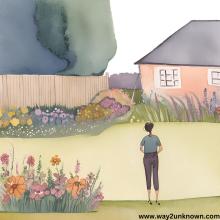The grass is always greener on the other side

"The grass is always greener on the other side" is a proverbial expression that encapsulates the human tendency to perceive others' situations as more desirable than one's own. It suggests that people often believe that different circumstances, places, or opportunities appear better than their current ones. The phrase originates from the visual illusion that grass looks greener from a distance or on another person's property, implying that appearances can be deceiving. For example, someone might envy a friend's seemingly perfect job or relationship without considering the challenges or shortcomings that exist in those situations.
This expression highlights the universal experience of longing for what seems unattainable or idealized. It underscores the importance of perspective and contentment in one's own circumstances. Often used to caution against comparing oneself unfavorably to others, it encourages individuals to appreciate and nurture their own situations rather than constantly seeking what appears better elsewhere. Recognizing that "the grass is always greener on the other side" can prompt reflection on gratitude and perspective, fostering a healthier outlook on life's challenges and opportunities.
